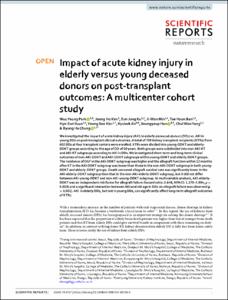KUMEL Repository
1. Journal Papers (연구논문)
1. School of Medicine (의과대학)
Dept. of Internal Medicine (내과학)
Impact of acute kidney injury in elderly versus young deceased donors on post-transplant outcomes: A multicenter cohort study
- Keimyung Author(s)
- Jin, Kyu Bok; Han, Seung Yeup
- Department
- Dept. of Internal Medicine (내과학)
- Journal Title
- Scientific Reports
- Issued Date
- 2020
- Volume
- 10
- Issue
- 1
- Abstract
- We investigated the impact of acute kidney injury (AKI) in elderly deceased-donors (DDs) vs. AKI in young DDs on post-transplant clinical outcomes. A total of 709 kidney transplant recipients (KTRs) from 602 DDs at four transplant centers were enrolled. KTRs were divided into young-DDKT and elderly-DDKT groups according to the age of DD of 60 years. Both groups were subdivided into non-AKI-KT and AKI-KT subgroups according to AKI in DDs. We investigated short-term and long-term clinical outcomes of non-AKI-DDKT and AKI-DDKT subgroups within young-DDKT and elderly-DDKT groups. The incidence of DGF in the AKI-DDKT subgroup was higher and the allograft function within 12 months after KT in the AKI-DDKT subgroup was lower than those in the non-AKI-DDKT subgroup in both young-DDKT and elderly-DDKT groups. Death-censored allograft survival rate was significantly lower in the AKI-elderly-DDKT subgroup than that in the non-AKI-elderly-DDKT subgroup, but it did not differ between AKI-young-DDKT and non-AKI-young-DDKT subgroup. In multivariable analysis, AKI-elderly-DDKT was an independent risk factor for allograft failure (hazard ratio: 2.648, 95% CI: 1.170-5.994, p = 0.019) and a significant interaction between AKI and old age in DDs on allograft failure was observed (p = 0.001). AKI in elderly DDs, but not in young DDs, can significantly affect long-term allograft outcomes of KTRs.
- Publisher
- School of Medicine (의과대학)
- Citation
- Woo Yeong Park et al. (2020). Impact of acute kidney injury in elderly versus young deceased donors on post-transplant outcomes: A multicenter cohort study. Scientific Reports, 10(1), 3727. doi: 10.1038/s41598-020-60726-8
- Type
- Article
- ISSN
- 2045-2322
- Source
- https://www.nature.com/articles/s41598-020-60726-8
- Appears in Collections:
- 1. School of Medicine (의과대학) > Dept. of Internal Medicine (내과학)
- 파일 목록
-
-
Download
 oak-2020-0555.pdf
기타 데이터 / 1.8 MB / Adobe PDF
oak-2020-0555.pdf
기타 데이터 / 1.8 MB / Adobe PDF
-
Items in Repository are protected by copyright, with all rights reserved, unless otherwise indicated.